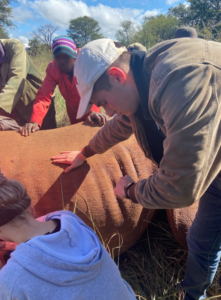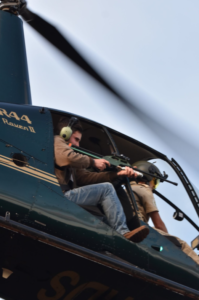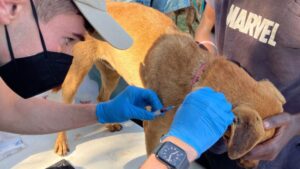Wildlife Veterinary Experience in the Field: South Africa Study Abroad

Chase Carey received a Forestry and Environmental Resources departmental scholarship to study abroad in South Africa in May 2022. This trip was facilitated through the South Africa: Wildlife Management & Conservation study abroad experience intended for Pre-Vet track students.
Carey and the other NCSU students on the trip spent most of their time in the Limpopo Province and Greater Kruger region of South Africa and went out in the field with Dr. Chris Boshoff from SA World Vets most days. They primarily conducted health assessments for antelope species such as nyala, kudu, and impala on privately owned game farms.They also spent time dehorning rhinos. “They take the horn off to deter poaching, because if poachers know that all the rhinos on a farm have been dehorned, they’re gonna be less likely to break in,” explained Carey. The rhino dehorning was part of a larger research project on the health of rhinos in captivity.

The prepacked hunting experiences which these game farms offer bring up some complex tradeoffs and ethical arguments. Carey found that breeding these animals for release is not as common as he would have liked. However, he saw how these operations can offer a stable source of income for local communities and help conservation efforts to some extent.
“Another animal species that we worked on a lot was Sables and Sables are actually really rare in the wild, but their populations in captivity have exponentially increased over the last, however many decades. If it weren’t for trophy hunting and these game farms, these species would pretty much have no economic reason to be around. And sad enough as that is, it would probably lead to their extinction or endangerment,” explained Chase.

In addition to the work on game farms, the team of students helped with a research project on
the impact of a nonprofit called Halo, which provides medical care to dogs in local communities. The students helped conduct physical examinations for dogs to see “how the rates of rabies or other things have decreased in the community as a result of the nonprofit’s care,” said Carey.

As a senior in the Fisheries, Wildlife, and Conservation Biology program and on a pre-vet track, this experience was professionally important for Carey. “It was kind of like a conformational experience for me because I went in with a little bit of doubt as to whether or not I wanted to be a wildlife vet or if I just wanted to be a biologist. But I definitely found myself at the end of every day when we finished all of our appointments, disappointed that the day was over, wanting to do more” explained Carey. After his study abroad trip, Carey applied for veterinary school and hopes to start in Fall 2023.
- Categories: